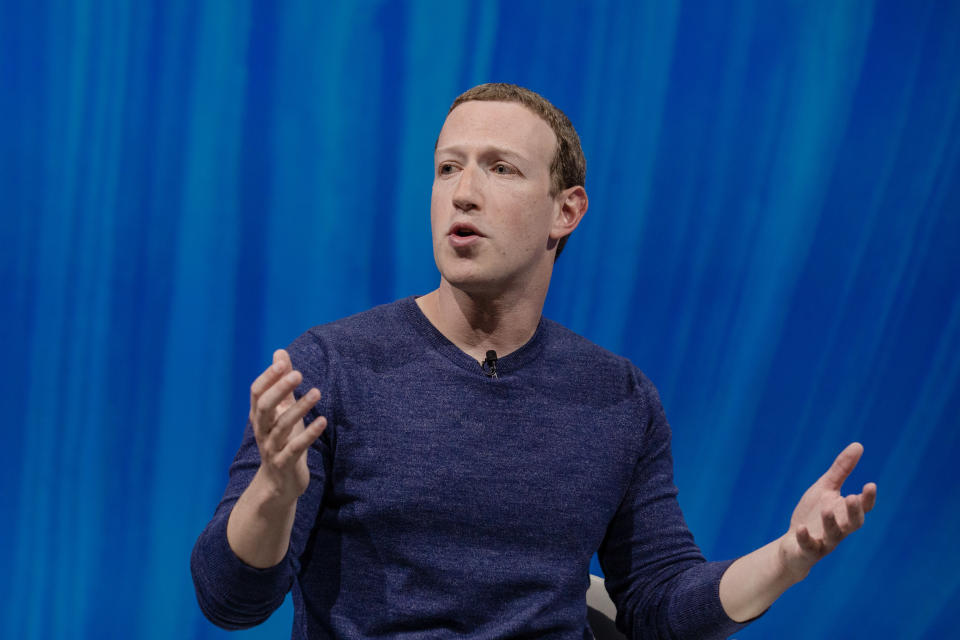'Where is Mark Zuckerberg?' Fury as international politicians rage against Facebook
The fury in the room was palpable as UK members of parliament and politicians from the around the world grilled a top Facebook executive in London over disinformation, fake news and privacy on the social media platform.
Their main question was: “Where is Mark Zuckerberg?”
The so-called “International Grand Committee” – with politicians from the UK and eight other countries, including Canada, Argentina, France and Brazil – were raising concerns about how data harvesting and fake news on Facebook could hurt modern day democracy. Yet Facebook’s (FB) CEO Zuckerberg was absent, declining to attend on two occasions.
Instead, he sent Facebook’s vice president of policy solutions, Richard Allan.
The group released a tweet on Tuesday at the start of the meeting, highlighting Zuckerberg’s absence with a photo of his empty seat: “9 countries. 24 official representatives. 447 million people represented. One question: Where is Mark Zuckerberg?”
9 countries.
24 official representatives.
447 million people represented.One question: where is Mark Zuckerberg? pic.twitter.com/BK3KrKvQf3
— Digital, Culture, Media and Sport Committee (@CommonsCMS) November 27, 2018
“We represent over 400 million people and to not have your CEO sit in that chair there is an offence to all of us in this room, and really our citizens as well,” Bob Zimmer, a Canadian member of parliament, said to Allan.
Allan said he took responsibility for Zuckerberg’s absence at this committee, noting his CEO had already appeared before the European Parliament and two US congressional committees, along with other hearings.
“Our intent is to be there. To answer the questions,” he said. “For some appearances, Mr. Zuckerberg has made himself available, but not for every appearance.”

Allan acknowledged the committee’s range of concerns, including the threat of foreign interference in elections and the spread of hateful messages, which had led to violence in some nations. Many politicians raised concerns about user privacy in the wake of the Cambridge Analytica scandal.
Facebook is being investigated by lawmakers in Britain after consultancy firm Cambridge Analytica, which worked on Donald Trump’s presidential campaign, obtained the personal data of 87 million users from a researcher, drawing attention to the use of data analytics in politics.
“While we were playing on our phones and apps, our democratic institutions… seem to have been upended by frat boy billionaires from California,” said Charlie Angus, a Canadian member of parliament.
The UK, European Union and a range of other nations have become aligned in their desire to regulate and rein in the influence of Facebook as a series of scandals have come to light.
Allan said Facebook welcomed the chance to work with lawmakers on social media regulations.
But Angus was unhappy with the prospect of Facebook playing a part in setting the rules.
“Don’t you see … you’ve lost public trust and cannot be trusted to police yourselves?” he said.
The event is being held just days after Britain’s parliament seized confidential Facebook documents from the developer of a now-defunct tech firm, a move that was considered unusually aggressive.
Damian Collins, in charge of the hearing and committee, said in a Sunday tweet that he had reviewed the documents.
“Under UK law & parliamentary privilege we can publish papers if we choose to as part of our inquiry,” he said.
Facebook has cautioned Collins that these documents, from 2013 and 2014, were compiled as part of a “meritless” legal case that the small tech company was bringing against Facebook, and the documents were “sealed” by the American courts, meaning they weren’t supposed to be seen by outsiders.

Facebook, which also owns Instagram and WhatsApp, has faced a barrage of criticism from users and lawmakers after it said last year that Russian agents used its platform to spread disinformation before and after the 2016 US presidential election, an accusation Moscow denies.
During the hearing, Allan repeatedly declined to give an example of a person or app banned from Facebook for misuse of data, aside from the GSR app which gathered data in the Cambridge Analytica scandal.
With files from Reuters and the Associated Press

 Yahoo Finance
Yahoo Finance 